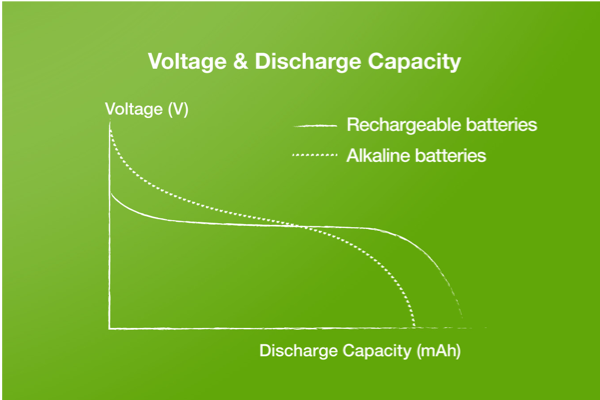How to choose the right battery
Picking out the right battery type can often be confusing, especially when faced with a variety of options. For example, should you choose single-use or rechargeable batteries? To help you select the right battery, we’ve broken down the essentials you need to know about each battery type.

Alkaline batteries deliver more power.
Preferred for the increasing power demand of everyday devices, our alkaline batteries are a great fit for an array of low to high-drain devices, such as toys, headlamps, game controllers and smoke detectors. That said, not all alkaline batteries are created equal, and performance will vary depending on the device’s drain rating.

Lithium batteries are best suited for extreme temperatures and long use times.
Durable, lightweight yet powerful, Lithium batteries are well-matched for high-tech devices that require prolonged use (e.g. smoke detectors and sensors), high-power input (e.g. photoflashes and portable motor-driven devices) and extreme temperatures (e.g. flashlights in severe cold conditions).

Rechargeable NiMH (Nickel Metal Hydride) batteries offer an eco-friendly charge.
While more expensive to purchase, this type of battery can be recharged hundreds of times for substantial savings in the long term. Rechargeable batteries perform well in high-drain devices that require repeated high-powered bursts of energy, such as toys and photoflashes.

*Picture shown is for illustration purpose only
Voltage is especially important.
When picking out the right battery, voltage is also crucial to consider. That’s because some devices will not operate properly (or will only operate for a short time) if paired with less-than-ideal voltage. Here’s something to remember: While alkaline batteries typically have a nominal voltage of 1.5 volts, rechargeable batteries have 1.2 volts; on the other hand, an alkaline battery will start its initial charge at 1.5 volts before tapering down to 1.2 volts in later charges.
How to maintain a battery: do's and don'ts
So, you’ve purchased the right batteries depending on your personal needs. The next step is to practice proper care and storage for longer battery life – and we’ve put together a few GP-approved dos and don’ts to guide you along the way.

- The DOs
- Do store batteries in a cool, dry place, or ventilated at room temperature and away from direct sunlight.
- Do keep them away from children to avoid swallowing accidents.
- Do remove all used batteries from a device at the same time, and replace them with new batteries of the same size and type.
- Do remove batteries from electronic devices if they will remain unused for a long period of time to avoid battery leakage.
- The DON’Ts
- Don’t subject batteries to adverse conditions, such as extreme temperatures and excessive overcharging.
- Don’t store batteries with metallic objects such as keyrings and coins to prevent short circuits.
- Don’t mix old and new batteries (or different types/capacities of batteries) into the same device to avoid ruptures or leakages that may result in personal injury or property damage.
- Don’t leave battery-powered devices switched on after the batteries are flat/depleted.
How to dispose of old batteries - the right way
Here are three safety tips to keep in mind when properly disposing of your batteries:
The valuable raw material in single-use batteries can be recycled and reused to create new products. Both primary and rechargeable batteries can be taken to recycling stations to ensure the batteries are recycled and saved from the landfill.
To minimize the number of batteries entering our landfills, GP promotes the use of rechargeable batteries as a single rechargeable battery can replace hundreds of single-use batteries. For the disposal of both rechargeable and single-use batteries, we encourage consumers to find a recycling station in their local communities.

Safety tip 1
Take caution when grouping used batteries for disposal. Since used batteries are often not completely discharged, this can potentially bring live batteries into contact with each other, creating safety risks. We recommend taping the contacts areas of each battery for an extra level of precaution.
Safety tip 2
If there is a battery leakage, quickly wash any part of your skin or objects that may have come in contact with the battery acid in order to avoid any serious damage. Finally, before carefully discarding them in the trash we suggest placing the damaged batteries into a plastic bag as a safeguard against any further acid damage.
Safety tip 3
Small batteries can cause serious internal injury or death if swallowed. It is important to keep batteries safely out of reach from children, especially when it comes to disposing of them. If your child swallows a battery, please seek immediate medical attention.
Let’s Stay in Touch!
Subscribe our newsletter and get the latest news, updates and exclusive deals to empower your everyday life.



